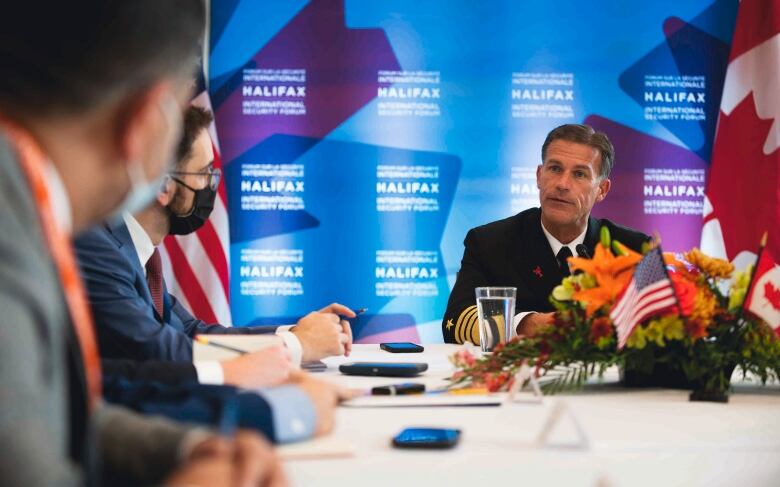U.S. admiral warns of China threat and urges allies to work and train more closely
Admiral John Aquilino says U.S. allies should move more urgently in face of evolving military situation

The United States and its allies should move more urgently in the face of rapidly evolving Chinese military tactics, the new U.S. commander of the Indo-Pacific region warned on Saturday.
Admiral John Aquilino spoke at the Halifax International Security Forum and urged allies to take part in more joint military exercises, which have been growing in size and complexity in the region over the last couple of years.
The exercises aim to allow like-minded nations to assemble quickly and work together seamlessly in a crisis.
In early October, a multi-nation combined fleet of four aircraft carriers and support ships with over 15,000 sailors took part in a drill in waters off the Japanese prefecture of Okinawa, a display meant to show solidarity in the face of increased tension in the region. The Canadian frigate HMCS Winnipeg was part of the exercise.
Aquilino said allies who are interested in defending the current international framework are welcome.

What's important, he said, is an appreciation for how the world is changing in Asia, sometimes not in good ways.
The admiral did not mention China by name during his formal speech, but was more direct when speaking with journalists.
"We're talking about intent, understanding where the [globe's] largest strategic competition is now going on," Aquilino told reporters during a roundtable discussion Saturday afternoon. "And then being able to bring any of your capabilities, any nation's strengths, and plug into this global set of like-minded nations that are operating to preserve peace and stability in the region."
Aquilino said the United States is committed to a free and open Indo-Pacific region and the rapid buildup of sophisticated Chinese military and paramilitary capabilities is a concern.
"Look at what the Chinese have said. President Xi [Jinping] has tasked his forces to be at a level of military parity with the United States by 2027. Those are his words," Aquilino said.
Increasing tension
Tension has increased dramatically over the last several months, some of it related to China's repeated test of Taiwan's air defence zone with fighter jets and bombers.
Claimed by China as its own territory, Taiwan has come under growing military and political pressure to accept Beijing's rule, to international concern.
Xi has vowed to realize "peaceful reunification" with Taiwan.
China has tested hypersonic missiles, which can deliver conventional — and soon nuclear — warheads anywhere in the world within minutes. It is also reportedly expanding its nuclear arsenal.
On Thursday, Chinese coast guard ships blocked and fired water cannons at two Philippine boats carrying supplies to a disputed South China Sea outpost. The Filipinos lodged a formal diplomatic protest.
China has in recent years laid claim to almost the whole South China Sea and constructed artificial islands where missile batteries have been installed.

Australia recently brokered a nuclear-powered submarine deal with the United States, breaking a contract with France to buy conventional submarines. The way the deal was handled politically angered France, straining relations among allies.
Canada's acting top military commander said the Australians made a tough decision in an increasingly tough time.
"Australia, as every country does, has done a security assessment of their neighbourhood. What capabilities do they require to protect their sovereignty?" Gen. Wayne Eyre said in an interview with CBC News. "And let's face it, that is an increasingly dangerous part of the world. So to have one of our closest allies invest in this kind of technology is not necessarily a bad thing."
Prime Minister Justin Trudeau has said Canada has no plans to acquire nuclear submarines of its own and dismissed the deal involving the United States, Australia and the United Kingdom as only being about selling defence hardware.
With files from Reuters

